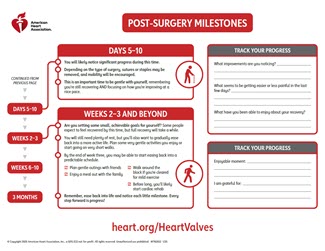Post Surgery Milestones: Managing Your Mood, Expectations and Goals
The emotions of recovery
Often people who are getting ready for major surgery have a whirlwind of details to juggle. “Who will handle my work responsibilities? Who can check on post-surgery prescriptions? How will the house chores get done?”
Most people don’t stop to think about how they can help themselves feel good emotionally during their recovery. Isn’t a positive outlook normal when things are going how they are supposed to go? For some people, yes. However, depression after a cardiac surgery is not uncommon.
Up to half of patients experience cardiac depression.
Although you may think of your moods as being somewhat dependent on how you feel or on your progress, especially after a major surgery, a positive outlook during recovery can improve your physical healing process. There are some proven strategies to help you improve your odds for feeling good during recovery.
Ask your health care team about the possibility of post-surgery depression and symptoms to consider.
Make sure you and those who live with you know the symptoms of depression. If you find yourself experiencing a sad or empty mood persistently, a loss of pleasure or interest in hobbies and activities that you normally enjoy or a consistent feeling of worthlessness or hopelessness, discuss your mood with your doctor. They may be able to prescribe a medication to help you bounce back, and warding off the blues can help you heal. However, there are several strategies you can use that don't involve medication.
What can I do to feel as well as I possibly can during recovery?
The good news is you can help yourself by:
- Practicing habits for emotional health
- Setting positive goals
- Maintaining realistic expectations
- Celebrating progress
Healthy habits: Move into a routine
One of the most reliable ways to keep your mood stable is to get moving. Exercise whenever your health care professional says you can, even you start out just shuffling down the hospital corridor. After surgery you don’t want to overdo it, but encouraging yourself to keep moving at a slow and steady rate will help you recover the right way.
Many people find keeping some sort of routine is very helpful for staying positive during recovery. Routines can include whatever keeps your spirits up, provided you have your health care professionals’ OK.
Liz Tatham, a spokesperson for the American Heart Association’s Go Red for Women campaign to raise heart-health awareness and former heart valve replacement patient, says: “One thing I made myself do each day after my first week home was to get up each day and change out of my pajamas into actual clothing. Even if I wasn't going anywhere, it helped me develop a daytime routine and a nighttime routine. It also made me feel that I was emotionally going somewhere because I was dressed to take on the day.”

By week three, she started making time for social opportunities.
"I had a friend pick me up and take me to lunch outside of the house every Wednesday until I was cleared to drive myself.”
She also advises: “Patients should definitely ask how much and how often they should get up to walk and how much they should increase their walking each week. Before I began cardiac rehab, I had a chart that told me how much I needed to walk and how many times a day. At week two, I started with 5-10 minutes three to five times a day. I would check it off the chart, even though I just walked laps within my home. The dog thought it was strange at first, but then he started walking laps with me. I know recovery is different for everyone, but again, if I had not been given such specific instructions, I would not have known how much I could walk or the importance of moving to lower my risk of stroke. I was moving much more than I thought I would be.”
Manage your expectations and celebrate your small milestones.
Learn the facts before you have your procedure so that you’ll know what to expect. The more you celebrate your small victories each day and notice the moments of gratitude, the more positive you will likely feel about your progress.

Print our Recovery Milestones checklist (PDF) and chart your progress toward wellness. This checklist is also available in Spanish (PDF).
Don’t feel defeated if you need help.
Some people need help in order to bounce back emotionally. That’s not failure. Success involves caring for yourself and those you love enough to do whatever is needed to rebound.
Print our pre-surgery checklist: Facing and Recovering from Major Surgery: English (PDF) | Spanish (PDF)






